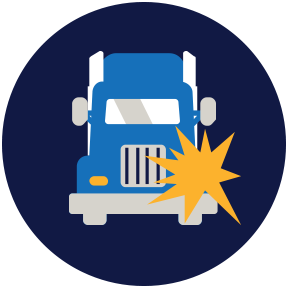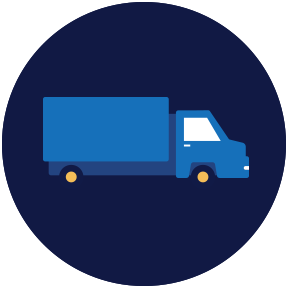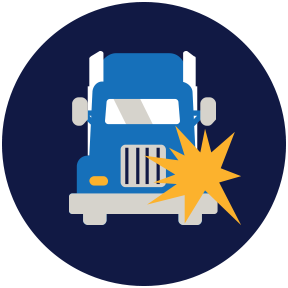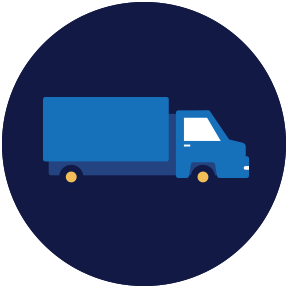FAQs
Browse frequently asked questions about the CCFP Heavy-Duty Truck Study.

About the Study
The Heavy-Duty Truck Study aims to collect and analyze data on at least 2,000 fatal crashes involving heavy-duty trucks (Class 7 and 8 trucks) over a two-year period.
The study will culminate in a final analytical report and public-use dataset of detailed, anonymized crash data (collected from the scene of the crash) that anyone can use to assess the root causes of crashes, monitor emerging trends, and take steps to keep our roadways safe.
In addition to providing detailed on-scene crash data specific to each crash in a public-use dataset, FMCSA may publish aggregated data from confidential interviews, which are protected under the Confidential Information Protection and Statistical Efficiency Act (CIPSEA) and carried out by the Bureau of Transportation Statistics (BTS), to analyze trends in fatal crashes involving heavy-duty trucks. This information will be fully compliant with CIPSEA data protections.
Since the original Large Truck Crash Causation Study (LTCCS) was conducted in 2001-2003, there have been many changes in technology, vehicle safety, driver behavior, and roadway design. Roadway fatalities have also risen recently. Fatal crashes involving large trucks and buses in the United States increased 26.4 percent from 2016 to 2022.*
The rise in crashes led Congress to require a new study on the causal factors that contribute to crashes involving commercial motor vehicles (CMVs). In response to Congress, FMCSA established the CCFP and the Heavy-Duty Truck Study to advance our understanding of these crashes.
*National Highway Traffic Safety Administration (NHTSA) Fatality Analysis Reporting System (FARS) data from 2016 to 2022.
Heavy-duty trucks refer to Class 7 and 8 trucks, which have a gross vehicle weight rating (GVWR) of 26,001 pounds or more. Examples of heavy-duty trucks include truck-tractor semi-trailers, furniture trucks, garbage trucks, and cement trucks. Heavy-duty trucks make up about 70 percent of large trucks involved in fatal crashes.*
*National Highway Traffic Safety Administration (NHTSA) Fatality Analysis Reporting System (FARS) data from 2016 to 2022.
The study will include crashes that occur in key sampling locations during the study’s data collection period, involve at least one Class 7 or 8 truck, and result in a fatality. This includes fatalities that occur at the crash scene or within 30 days as a result of injuries sustained in the crash. If the crash resulted in serious injuries but no fatalities occur within 30 days, the crash may become part of the study’s convenience sample of serious injury crashes.
The study will collect data from the crash site and from the vehicles and parties involved in the crash to understand contributing factors such as:
- Driver Factors: Driver qualifications, working environment, fatigue, distraction, history, health, and behaviors
- Vehicle Factors: Maintenance, defects, inspection history, vehicle design, and load characteristics
- Motor Carrier Factors: Operation type, carrier characteristics, and carrier performance
- Environmental and External Factors: Roadway design, infrastructure, weather, road condition, and work zones
- Role of Light Vehicles and Vulnerable Road Users: Ways passenger vehicles, and other non-motorists may affect crash risk or severity
FMCSA is partnering with State and local agencies to incorporate the data their experienced on-scene crash responders already collect. The study will also gather relevant data available in State and Federal systems, such as State crash repositories and FMCSA’s SafeSpect inspection platform. This approach will allow the CCFP to gain a more comprehensive, authoritative view of the circumstances surrounding each crash while avoiding duplicate efforts at the crash scene, reducing costs, and improving the timeliness and quality of the data.
Other data will be collected through confidential interviews with individuals and companies involved in the crash. These interviews will be conducted by the Bureau of Transportation Statistics (BTS) and protected under BTS’s confidentiality statute and the Confidential Information Protection and Statistical Efficiency Act (CIPSEA).
The study aims to collect a nationally representative sample of data on 2,000 fatal crashes involving heavy-duty trucks from about 30 States identified as key sampling locations.
FMCSA identified key sampling locations by evaluating historical crash rates and asking States about their existing crash data collection procedures and capacity to participate in the study.
States that were not identified as key sampling locations can still participate in the program by contributing data to the CCFP database.

Confidential Interviews Back to top
The Bureau of Transportation Statistics (BTS) will interview people and companies that are involved in the crashes included in the study sample. Potential interview participants include commercial motor vehicle (CMV) operators, motor carriers, dispatchers, passenger vehicle drivers, non-motorists, and witnesses.
The confidential interviews will address topics such as scheduling, vehicle inspection and maintenance, driver hiring practices, driver compensation and benefits, distracted driving, truck stop/rest area availability, and other key topics.
FMCSA is partnering with the Bureau of Transportation Statistics (BTS) to conduct confidential interviews under BTS’s confidentiality statute and the Confidential Information Protection and Statistical Efficiency Act (CIPSEA) protections.
Under CIPSEA protections, BTS:
- Must make a pledge of confidentiality
- Must use the information for statistical purposes only
- Must protect the information from unauthorized access, including by other government agencies
In addition, identifiable interview information protected by CIPSEA:
- Cannot be used for regulation or enforcement
- Cannot be used for legal purposes (e.g., subpoenaed or submitted as evidence)
- Cannot be released under a Freedom of Information Act (FOIA) request
To protect the privacy of respondents, BTS will compile information and provide aggregated, anonymized data to FMCSA for use in the Heavy-Duty Truck Study. FMCSA will not receive access to the original, complete interview data or any information that could tie interview responses to a specific individual, company, or crash.
BTS is part of the U.S. DOT and is one of 13 principal statistical agencies in the Federal government, which means its principal mission is statistical work. Established in 1992, it maintains an independent function within the U.S. DOT.
Similar to the Census Bureau and the Bureau of Labor Statistics, BTS does not regulate or enforce. It operates independent of political influence so that it can function as a fact-finding organization, focused exclusively on producing reliable, authoritative information. BTS collects, compiles, analyzes, and publishes data to support public and private decision making.
BTS has extensive experience collecting and protecting confidential information for statistical purposes. The agency’s confidentiality statute (49 U.S.C. 6307(b)) and the Confidential Information Protection and Statistical Efficiency Act (CIPSEA) (44 U.S.C. 3561-3583) protect the information BTS collects. These laws ensure that any identifying, sensitive, or proprietary information that BTS collects is not released to unauthorized persons or organizations, including FMCSA.
CIPSEA is a U.S. Federal law that:
- Establishes uniform confidentiality protections for information collected solely for statistical purposes.
- Ensures the confidentiality of information collected by Federal statistical agencies.
- Promotes efficient data sharing among designated Federal statistical agencies while protecting the privacy of respondents.
CIPSEA (44 U.S.C. 3561-3583) was enacted in 2002 and reauthorized in 2018 as part of the Foundations for Evidence-Based Policymaking Act.
BTS takes its commitment to protect confidential information very seriously. BTS has a comprehensive set of procedures in place to ensure confidential data is protected and secure.
All BTS employees and contractors must:
- Participate in annual confidentiality training; and
- Sign a non-disclosure agreement, subjecting them to laws with stiff penalties for unauthorized release of confidential information.
All reports and products developed from confidential data are subjected to additional BTS review prior to release to ensure confidential information is not disclosed.
BTS maintains close oversight of its employees and contractors to ensure they follow all information security protocols and confidentiality procedures.
In addition, BTS implements procedures to secure its:
- Information systems; and
- Physical space.
These procedures block outside access to confidential information stored on BTS computers and databases. BTS takes additional steps to ensure released data cannot be used to infer information about individuals or businesses.

Study Results Back to top
Yes. At the conclusion of the study, FMCSA will publish a final analytical report and a public database of anonymized crash data.
FMCSA will release study findings after data collection and analysis are concluded. The CCFP expects to collect data from 2026 to 2028. FMCSA plans to publish a final analytical report and public database of anonymized crash data in 2029. Partial data findings and analysis will be released prior to the final report.
In addition to a final analytical report, the CCFP will establish a public database of de-identified (anonymized) crash data with tools to support nuanced analysis.
You can analyze this data to better understand how many crashes are occurring, where they are taking place, and what factors may contribute to their occurrence. These insights can help you and others address root causes, monitor emerging trends, and proactively take steps to keep our roadways safe.

What to Know If You're a Motor Carrier Back to top
Here’s what you need to know about the study.
- If your Class 7 or 8 truck driver is involved in a fatal crash in a sampling location, the CCFP will collect data about that crash for the study.
- This data collection will not significantly change the usual on-scene crash response. FMCSA is incorporating the data States and local agencies collect to streamline data collection efforts.
- The Bureau of Transportation Statistics (BTS) will conduct confidential interviews to collect additional information for the CCFP. These interviews are protected by BTS’s confidentiality statute and the Confidential Information Protection and Statistical Efficiency Act (CIPSEA).
- After a qualifying crash, BTS may interview your driver, as well as other representatives from your company, passenger vehicle drivers, non-motorists, and witnesses. These interviews will provide a more comprehensive view of the crash.
- As a motor carrier, you know the importance of safety for your drivers and your business. This study will provide resources you can use to better understand the factors that contribute to crashes so you can improve safety for your company and your drivers.
You can help support a successful study by encouraging your drivers to provide candid, detailed responses if they are interviewed during the study. This information will help the CCFP gain a more comprehensive understanding of crashes.
You can also tell your drivers that the interviews will be protected by strict confidentiality laws, so the information they provide during the interview cannot be used for enforcement or legal purposes, nor can it be released under a Freedom of Information Act (FOIA) request. FMCSA is partnering with the Bureau of Transportation Statistics (BTS) to conduct the interviews under BTS’s confidentiality statute and Confidential Interview Protection and Statistical Efficiency Act (CIPSEA) protections.
You may also wish to emphasize that the information they provide will help inform crash-prevention strategies to make our roads safer.
No. Your company will not be publicly identified as part of the study. All information collected will be aggregated and anonymized as part of the public database for the study.
No. All confidential interviews carried out by the Bureau of Transportation Statistics (BTS) for the CCFP will be protected by BTS’s confidentiality statute and the Confidential Information Protection and Statistical Efficiency Act (CIPSEA), so your company cannot be held liable for anything shared during these interviews.
No. All confidential interviews carried out by the Bureau of Transportation Statistics (BTS) for the CCFP will be protected by BTS’s confidentiality statute and the Confidential Information Protection and Statistical Efficiency Act (CIPSEA). As a result, you will not have access to your driver’s responses.

What to Know If You're a Driver Back to top
Here’s what you need to know about the study.
- If you are involved in a fatal crash in a sampling location while operating a Class 7 or 8 truck, the CCFP will collect data about that crash for the study.
- This data collection will not significantly change the on-scene crash response you see today. FMCSA is incorporating the data States and local agencies already collect to make the data collection process more efficient.
- The Bureau of Transportation Statistics (BTS) will conduct confidential interviews to collect additional information for the CCFP. These interviews are protected by BTS’s confidentiality statute and the Confidential Information Protection and Statistical Efficiency Act (CIPSEA).
- After a qualifying crash, BTS may interview you as well as other representatives from your company, passenger vehicle drivers, non-motorists, and witnesses to get a more complete picture of the crash.
- As a driver, you bring safety to the road. This study will provide information you can use to help improve safety for yourself, your carrier, and everyone else on the road.
Heavy-duty truck drivers involved in crashes have first-hand knowledge of what happened leading up to the crash. They also have deep experience and insights about factors specific to heavy-duty trucks and commercial motor vehicle (CMV) operations.
If you are asked to participate in a confidential interview, providing candid, detailed information will help the CCFP gain a more comprehensive understanding of crashes and the factors that contribute to them.
The information drivers provide will help ensure the study’s insights are grounded in reality and inform crash-prevention strategies to make our roads safer.
No. Your interview with the Bureau of Transportation Statistics (BTS) will be protected by BTS’s confidentiality statute and the Confidential Information Protection and Statistical Efficiency Act (CIPSEA), so you cannot be held liable for anything you share during this interview.
No. Your interview with the Bureau of Transportation Statistics (BTS) will be protected by BTS’s confidentiality statute and the Confidential Information Protection and Statistical Efficiency Act (CIPSEA), so your employer will not have access to your responses.

 About the Study
About the Study  Confidential Interviews
Confidential Interviews  For Motor Carriers
For Motor Carriers